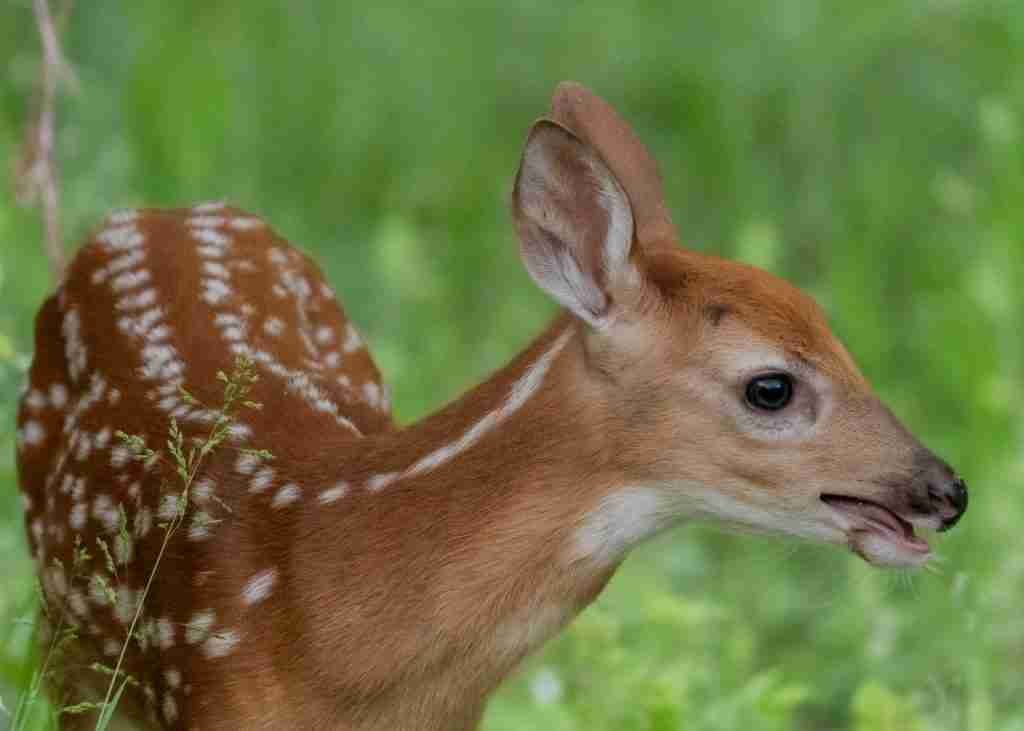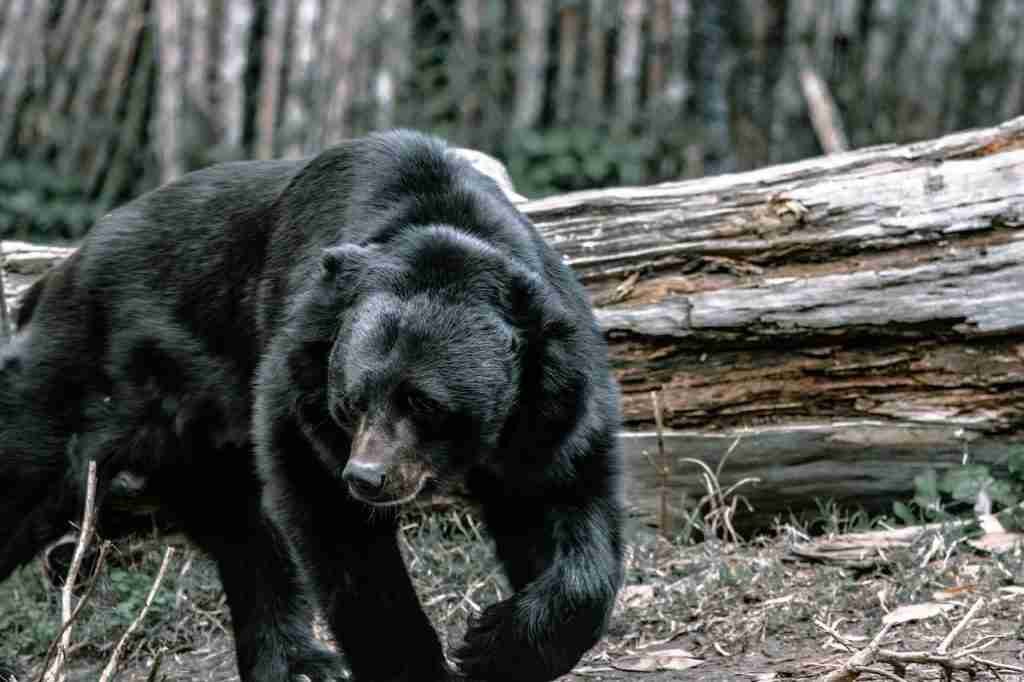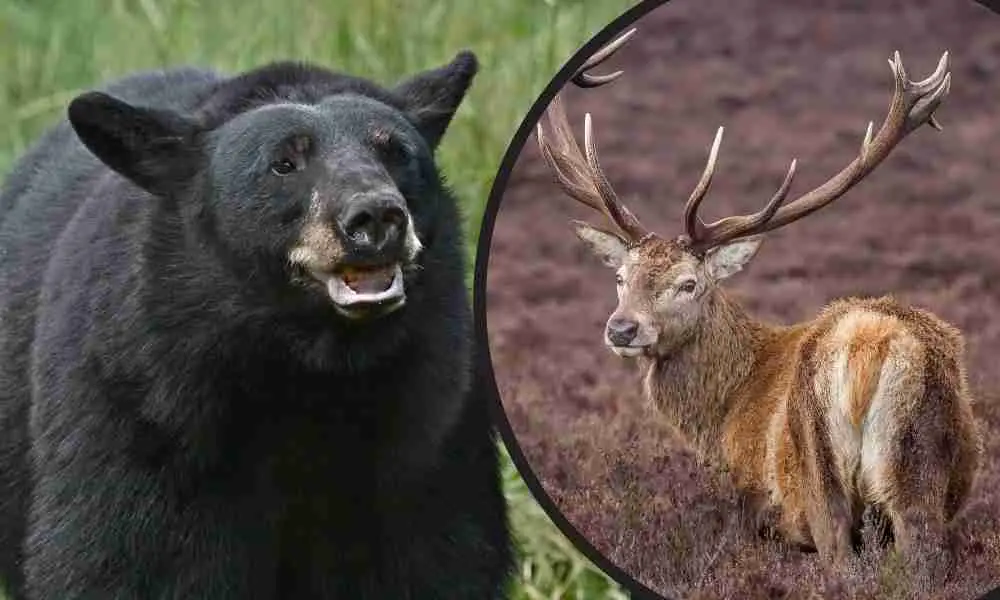Being opportunistic omnivores, black bears can eat different kinds of foods available in their habitat. Sometimes, they can feed on leaves, berries, fish, insects, and small mammals.
Now, the big question is do black bears eat deer?
While black bears mainly feed on a plant-based diet, they do occasionally eat deer if the opportunity arises.
Furthermore, they’ll prefer to hunt and eat young deer because they’re easier to attack. Even though a black bear can attack an adult deer, it is not a common occurrence.
Come to think of it, what type of deer do black bears eat?
In this article, I’ll answer this question and other interesting ones about black bears and deer predation.
Get comfortable and keep reading to learn more!
What Type Of Deer Do Black Bears Eat?
Even though it’s been established that black bears can eat deer, they have preferences. Let’s discuss the ones they can eat and those they don’t like.
Do Black Bears Eat Deer Fawns?

Yes, black bears eat deer fawns, especially when food is scarce in their habitat. Typically, the mother deer gives birth to her young in the mid or late spring.
Since they’re weak and defenseless at birth, the deer have to hide their fawns from predators. But the black bears are excellent hunters who can easily gain access to where the young deer are resting.
However, it is unlikely for a black bear to attack young deer that are under the protection of their mother.
Keep in mind that black bears only feed on fawns occasionally since they can eat a wide range of diets.
Do Black Bears Eat Dead Deer?
Black bears can eat dead deer if they find one in their habitat. As I mentioned earlier, these bears are opportunistic animals that can eat any available food when hungry.
Although they mostly feed on vegetation such as nuts and berries, black bears can eat dead animals, including deer. Having a sharp sense of smell allows the bears to perceive the odor of decomposing flesh from afar.
Even though black bears can eat dead animals, it only happens once in a while. Generally, they prefer to consume fresh plants and small mammals.
Do Black Bears Eat Mule Deer?
Although black bears can eat mule deer, it is only on rare occasions. Even though they have the techniques to hunt large animals, they prefer to attack smaller ones.
And so they feed on vegetation, fruits, berries, and small mammals. Not only do these diets provide enough food for these animals, but they’re also rich sources of nutrients.
In some cases, the black bears can eat the carcass of the mule deer or the young mule deer. But this only happens when there’s a food shortage or the black bears come across a weak mule deer.
Since there’s abundant food in their habitat, these bears do not need to look for mule deer to hunt down.
Do Black Bears Eat Whitetail Deer?
Yes, black bears can feed on whitetail deer, especially their fawns or weak ones. But sometimes they eat small, sick, or weak animals, including whitetail deer.
Although it happens, it’s rare for black bears to hunt down a healthy adult whitetail deer. This is because white-tailed deer run faster when they sense the presence of predators.
Additionally, black bears are easy-going animals that prefer to eat the food they come across rather than attack large animals.
When Do Black Bears Usually Hunt Deer?

Usually, black bears hunt deer in the fall, when plants are beginning to wither. During this period, these bears will be preparing to go into hibernation and will need as much food as possible.
Since plants are becoming scarce, they’ll focus their attention on hunting animals, including deer. Black bears hunt animals to build up their fat reserves as they hibernate through the winter months.
How Do Black Bears Hunt Deer?
Black bears hunt deer the same way they prey on other animals. Using their keen sense of smell, black bears can sense the presence of deer from a long distance.
So, they’ll keep moving gently towards the prey while remaining unnoticed, then attack. Sometimes, the bear may wait in a hidden place and strike when the deer appears.
To kill a deer, the black bear will bite its neck or use its forepaw to break its backbone. Black bears feed on the remains of deer for many days.
Can A Black Bear Outrun A Deer?
No, a black bear cannot outrun a deer because they’re fast animals. When at their top speed, the deer can reach a speed of 55–65 kilometers per hour (35–40 miles per hour).
On the other hand, the black bear can only reach a speed of 48 kilometers per hour (30 miles per hour) on average. Generally, deer have a lower body weight compared to black bears.
Also, they are more agile and can run quickly through thick forests. Even though black bears can run at their top speed, they can’t meet up with the deer.
How Many Deer Does A Bear Kill Per Year?
Knowing the total number of deer that a bear kills per year can be challenging. This is because bears do not usually hunt deer unless food is scarce.
Moreover, most deer killings happen in the wild, which people cannot bear witness to.
How Do You Tell If A Black Bear Killed A Deer?
A black bear will leave large claw marks on the sides and shoulders of the deer it kills. It will also open the body of the deer and feast on the liver and other internal parts as they contain more nutrients.
After the bear is fully satisfied, it will cover the remains of the animal with leaves or moss to eat them later.
Recap
Black bears are peaceful animals that rarely attack deer. Nature allows them to eat plant-based diets and small mammals, which are abundant in their habitat.
Occasionally, the bears may hunt the deer as they approach hibernation season.
Interestingly enough, the attack doesn’t happen regularly. Typically, black bears are content with the food they find in their immediate environment.
Perhaps there are black bears in your neighborhood and you have pet dogs.
Check out this article Are Black Bears Afraid Of Dogs? to know whether the bears pose a threat to your dogs or not!
Sources:

